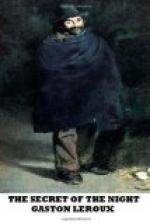“Since you have dined with him, tell us what kind of a man he is aside from his fattish qualities,” said the curious councilor. “So many things are said about him. He certainly seems to be a man it is better to stand in with than to fall out with, so I accept his invitation. How could you manage to refuse it, anyway?”
“When he first offered me hospitality,” explained the advocate, “I didn’t even know him. I never had been near him. One day a police agent came and invited me to dinner by command — or, at least, I understood it wasn’t wise to refuse the invitation, as you said, Ivan Petrovitch. When I went to his house I thought I was entering a fortress, and inside I thought it must be an umbrella shop. There were umbrellas everywhere, and goloshes. True, it was a day of pouring rain. I was struck by there being no guard with a big revolver in the antechamber. He had a little, timid schwitzar there, who took my umbrella, murmuring ‘barine’ and bowing over and over again. He conducted me through very ordinary rooms quite unguarded to an average sitting-room of a common kind. We dined with Madame Gounsovski, who appeared fattish like her husband, and three or four men whom I had never seen anywhere. One servant waited on us. My word!
“At dessert Gounsovski took me aside and told me I was unwise to ‘argue that way.’ I asked him what he meant by that. He took my hands between his fat hands and repeated, ’No, no, it is not wise to argue like that.’ I couldn’t draw anything else out of him. For that matter, I understood him, and, you know, since that day I have cut out certain side passages unnecessary in my general law pleadings that had been giving me a reputation for rather too free opinions in the papers. None of that at my age! Ah, the great Gounsovski! Over our coffee I asked him if he didn’t find the country in pretty strenuous times. He replied that he looked forward with impatience to the month of May, when he could go for a rest to a little property with a small garden that he had bought at Asnieres, near Paris. When he spoke of their house in the country Madame Gounsovski heaved a sigh of longing for those simple country joys. The month of May brought tears to her eyes. Husband and wife looked at one another with real tenderness. They had not the air of thinking for one second: to-morrow or the day after, before our country happiness comes, we may find ourselves stripped of everything. No! They were sure of their happy vacation and nothing seemed able to disquiet them under their fat. Gounsovski has done everybody so many services that no one really wishes him ill, poor man. Besides, have you noticed, my dear old friends, that no one ever tries to work harm to chiefs of Secret Police? One goes after heads of police, prefects of police, ministers, grand-dukes, and even higher, but the chiefs of Secret Police are never, never attacked. They can promenade tranquilly in the streets or in the gardens of Krestowsky or breathe the pure air of the Finland country or even the country around Paris. They have done so many little favors for this one and that, here and there, that no one wishes to do them the least injury. Each person always thinks, too, that others have been less well served than he. That is the secret of the thing, my friends, that is the secret. What do you say?”




